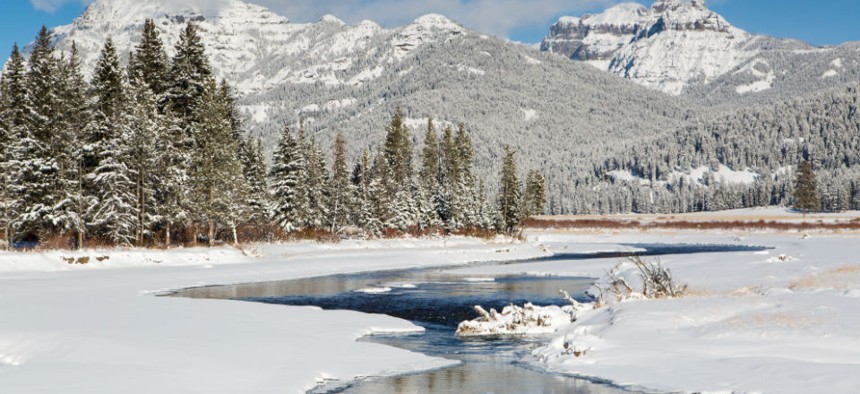
Snow on Soda Butte Creek and the Absarokas in Yellowstone National Park. Neal Herbert/NPS
Next Time You Visit a National Park, You Might Get a Lecture on Climate Change
Park rangers are increasingly talking to visitors about global warming.
"Hey, you want to save some money?"
That's the first thing Brian Ettling says when he meets a climate-change skeptic.
Ettling has spent his summers working as a park ranger at Crater Lake National Park in Oregon for nearly a decade. He is on a mission to teach visitors that man-made global warming is real. But climate change can be a touchy subject. So Ettling devised a strategy. When a park visitor casts doubt on global warming, he makes an appeal to their pocketbook.
"I try to shift the conversation away from polar bears and ice caps," Ettling says. "I tell people there are a lot of things they can do to save money on their electric bill that will also help the environment. Usually, I can get through to them that way."
Ettling has had time to perfect the approach. He started talking about the impact of climate change at Crater Lake several years ago. Ettling decided to speak up, he says, partly because visitors kept asking about global warming.
National parks are on the front lines of climate change. And park rangers are increasingly delivering the message that global warming is taking a toll on the iconic areas. Scientists say evidence of a warming Earth can be seen everywhere from rapidly melting glaciers at Glacier National Park in Montana to rising sea levels in the Florida Everglades. Park officials lament the changing landscape. But they say climate change also creates an opportunity to turn parks into open-air classrooms.
Educational efforts have ramped up in recent years. Great Smoky Mountains National Park, which spans parts of North Carolina and Tennessee, has hosted climate-science workshops for high school and middle school teachers as well as college professors. California's Golden Gate National Recreation Area produces a podcast that discusses global warming. The visitors' center at Yosemite National Park in California is chock-full of climate change brochures and fact sheets.
"We have an opportunity to take a seemingly faraway concept and make it tangible and real by showing how Yosemite has been affected," says Paul Ollig, the park's deputy chief of interpretation and education.
The National Park Service trains staff to talk to visitors about global warming, an initiative that has won support in the highest reaches of the administration. Earlier this month, the White House issued a directive asking the Park Service to create a national blueprint for climate education. Park rangers won't be required to teach climate change. But officials say the project will encourage parks to up their educational offerings.
"We still have some park managers who think it's too controversial to talk about climate change," says Julia Washburn, the Park Service associate director for interpretation and education. "This nationwide plan will really show that this is a priority."
However, some park rangers experience anxiety at the thought of talking about an often controversial subject. Rangers worry that they don't know enough about the science to sound credible. Park staff also fear a hostile reaction from visitors.
A contentious debate over the existence and causes of climate change continues to rage, despite the fact that the vast majority of scientists say that global warming is real and driven by human activity like the burning of fossil fuels.
"It's rare for a ranger to be accosted by someone who has strong opinions denying climate change, but that definitely crops up," says Bob Lillie, a park ranger who has worked at Crater Lake and Yellowstone National Park in Wyoming.
More than 280 million people visit national parks each year. But visitors who don't believe in global warming may opt out of educational talks and leave climate brochures sitting on the shelves of visitor centers.
Ettling avoids arguing with visitors who deny climate change. Instead, he spends much of his time talking to people who are concerned but not entirely certain that it is real.
"Anyone who is on the fence, those are the people I have the best chance of reaching," he says.
Rangers are also optimistic that visitors may be more receptive to learning about global warming when confronted with the impacts of extreme weather up close.
"Parks are so special to people. They really are national treasures. So I think it's powerful for people to see that and see how things have changed," Lillie says.
Amid all the talk of global warming, the Park Service wants to make sure that visitors are not overwhelmed. To that end, officials encourage rangers to highlight ways the service is working to protect parks from extreme weather and increase resilience.
Ettling is quick to tell visitors that the future is not all doom and gloom. And he is always ready to spell out steps people can take to aid the environment in their daily lives.
"You really have to deliver a positive message," he says. "I want people to know that there are things they can do to deal with this. Otherwise talking about global warming could hurt more than help."







